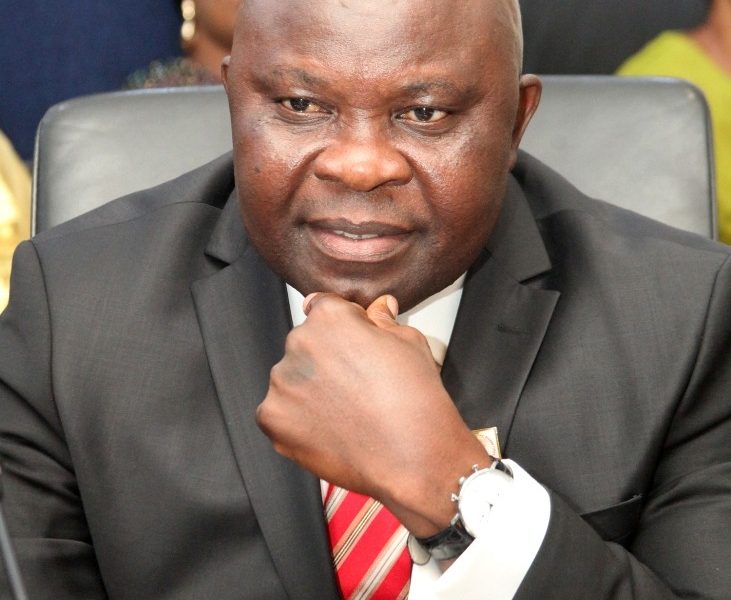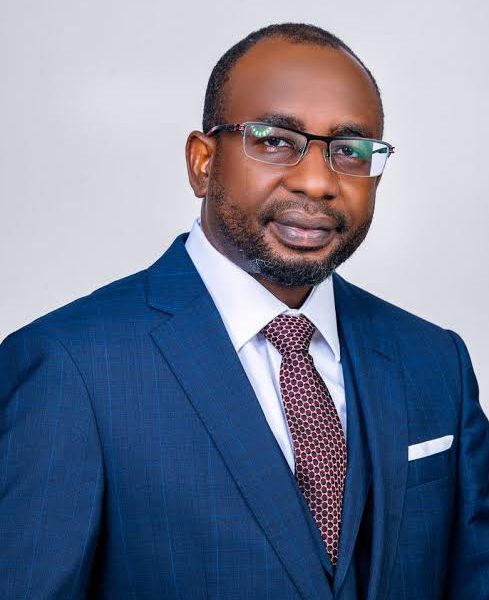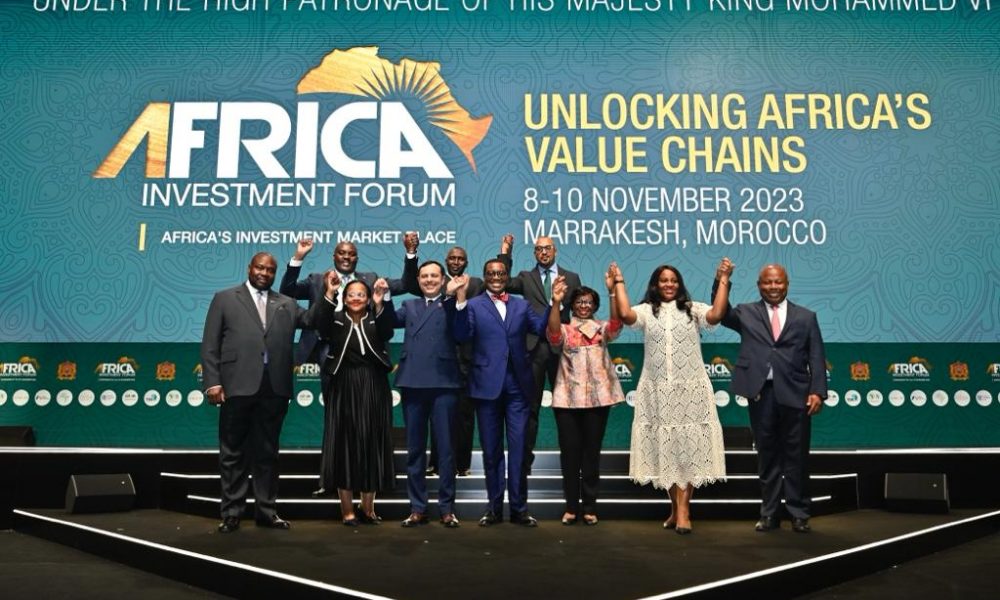The attention of the Citizens Watch Advocacy Initiative (CWAI), has been drawn to the Africa’s premier flagship news making event and formidable platform as a result of the remarkable milestones generated to the tune of 34.82 billion investment during the recently held Africa Investment Forum (AIF) market place in Marrakesh, Morocco from 8 to 10th November, 2023. The African renaissance platform of connectivity and corridors with its challenges of poverty, unemployment, insecurity, inequality and inconsistencies of government policies including intra-African trade that has remained abysmally low at about 15% must be re-engineered for growth by the continent’s leaders, so as to meet with other developing nations. Indeed, African leaders has so much on their table to be delivered which has been championed by the AIF an arm of the AfDB to continuously guide, encourage and support the economic growth and paradigm shift in the continent.
The Africa Investment Forum (AIF), which is an arm of the Africa Development Bank (AfDB), recently held an annual investment forum entitled ‘Africa’s Investment Market Place in Marrakesh, Morocco,’ with a bankable $34.82 billion investment interest.
The theme of the three-day event was, “Unlocking Africa’s Value Chains.” The event which was graced by His Majesty, Mohammed VI, King of Morocco, was a high-level, top-notch event and a very successful one. It was aimed at charting a new course for Africa’s new prosperity and connectivity.
The auspicious African flagship platform and global brand was attended by Heads of State and Governments; Ministers from Africa; Captains of Industries and Corporate Africa, prominent among whom were His Excellency, Mr. Azali Assoumani, President of the Union of Comoros, and Chairperson of the African Union; Her Excellency, Ms. Samia Suluhu Hassan, President of the United Republic of Tanzania; Her Excellency, Ms. Mia Amor Mottley, Prime Minister of Republic of Barbados; His Excellency, Mr. Julius Maada Bio, President of the Republic of Sierra Leone; His Excellency, Mr. Edouard Ngirente, Prime Minister of the Republic of Rwanda; Her Excellency, Ms. Nadia Fettah Alaoni, Minister of Economy and Finance of the Kingdom of Morocco, and Honourable Ministers that included Professor Benedict Oramah, President of the African Export-Import Bank; Mr. Samaila Zubairu, President of the Africa Finance Corporation (AFC); Mr. Alain Ebobisse, Chief Executive Officer of the Africa 50; Ms. Boitumelo Mosako, Chief Executive Officer of the Development Bank of Southern Africa; Mr. Werner Hoyer, President of the European Investment Bank; Dr Muhammad Sulaiman Al Jasser, President of the Islamic Development Bank; Mr. Admassu Tadesse, President Emeritus and Managing Director, Trade and Development Bank; His Excellency, Babajide Sanwolu of Lagos State of Nigeria. Others in attendance were business leaders and investors from around the globe.
Sub-themes discussed at the event included: Digital Disruptors and Transformative Technology, Renewable Energy and Natural Capital; Accelerating Green Growth, Climate-Resilient Infrastructure; Securing the Future, Capital Market; Mobilizing Investment for Transformational Growth, Africa’s Creative Industries: Strategies for Promoting Investment and Growth, and was a response to the Feed Africa Commitment of the AfDB and other Partners at Africa Investment Forum, which unveiled a platform known as the Alliance for Special Agro-industrial Processing Zones to mobilise equity funding for the continent’s agro-ecosystem.
At the event, King Mohammed VI reiterated that Africa Investment Forum was the place where bankable projects in Africa meet with investors, where investors meet with Heads of State and Governments in investment boardrooms converge and give comfort to investment as a result of which risks are managed and deals closed.
According to the Executive Secretary of Citizens Watch Advocacy Initiative (CWAI), Omoba Kenneth Aigbegbele, who was a participant, “The event has been considered by stakeholders as the most strategic and important in terms of conveying power and capacity to galvanise investment actions on the continent, and harness its resources. From what happened in Morocco, the Africa Investment Forum (AIF) is indeed, renowned to be Africa’s premier investment market place.”
At this year’s event, His Excellency, Mr. Omar Kabbaj, Advisor to the King, representing His Majesty Mohammed VI, King of Morocco, stated: “The AIF is unique, it is not just any forum; it is a transactional platform, where real business is conducted; where deals are made and where actions supersede rhetoric.”
It was also revealed that since the launch of the Africa Investment Forum in 2018, AIF has drawn more than 16, 500 participants; generated investment interests of nearly $143 billion.
A retrospective analysis was made at the 2022 AIF Market Days, wherein the Abidjan – Lagos highway corridor was able to secure $15.5 billion of investment interests: What makes the AIF unique and remarkable is that it is highly innovative and 100% transactional. Investors have discovered that there is no other global investment forum like it. “They develop and curate projects; reduce transaction costs and risks and accelerate the closure of deals. They also improve the overall business environment within which projects and investments are structured, developed and delivered, making investments to land in Africa smoothly.”
Nevertheless, this corridor will transform the entire West Africa region and speed up regional integration and trade. Also, last year, other investment interests were secured for 3.6 billion dollars for the East Africa Railway corridor, linking Tanzania, Democratic Republic of Congo and Burundi respectively. That the AIF has so far closed on deals, investment gaps with 11 billion dollars, ranging from Liquefied Natural Gas (LNG) renewable energy, agribusiness, industrial manufacturing, creative industry, housing and transport.
According to global statistics, the Africa population will reach 2.5 billion by 2050; the continent will account for 25% of the global population. The New York Times recently affirmed in a headline what we know that the world is becoming more African. With a youth population of 477 million people between the ages of 15 and 25, Africa will be key for supplying the global labour force. Then, the size of the food and agriculture market in Africa will be worth one trillion dollars by 2030, in less than seven years from now.
It was revealed at the event that the future of the $7 trillion electronic vehicle market is tied to Nigeria and other African countries. Also, the size of the electric vehicles value-chain is estimated to increase from the current $7 trillion, to 157 trillion dollars by 2050.
According to the President of AfDB, Dr. Akinwumi Adesina, the future depends on Africa. That is because, as he asserted, Africa accounts for the largest source of the green metals for the development of electric vehicles, including platinum (70%), cobalt (52%), manganese (46%), bauxite (25%) and graphite (21%).
An assessment by Bloomberg NEF shows that the cost of manufacturing of lithium-iron precursor batteries in Africa is three times less than in the United States, China and Poland, all together. The global electric vehicle market has experienced significant growth, which is driven by increasing environmental concerns and advancement in technology. China, the United States and Europe are the three biggest electric vehicle markets globally. China has incentives such as subsidies, tax breaks and license plate restrictions which has encouraged consumers to embrace electric mobility.
President of AfDB, Dr. Akinwumi Adesina, further said, “Five of the six pre-pandemic top performing African countries are projected to be back in the league of the world’s 10 fastest growing economies for 2023-2024. African economies provide some of the best investment opportunities in the world.”
The Africa Continental Free Trade Area, when fully operational, offers incredible opportunities for boosting intra-regional trade across borders and regions as well as the emergence of a more competitive national, regional and globally connected value chain as envisaged in the Special Sessions on Regional Corridors: Quest to Integrate Africa. This, it was agreed, can only be achieved through the development of infrastructure.
The AfDB and partners are implementing the 20 billion dollars Desert-to-Power Initiative to develop 10GW of solar power across 11 countries of the Sahel zone, when completed, will be the largest solar zone in the world. These countries are ; Nigeria, Burkina faso, Cameroon, Chad, The Gambia, Guinea, Mauritania, Mali, Niger, Eritrea and Senegal including the Sahel regional transmission lines to assume reliable and competitively priced electricity for development of the corridors. The AfDB also supports the development and expansion of regional power pools, in collaboration with the African Union Commission and Regional Economic Communities.
“That is the Africa we want: A Fully Interconnected Africa, using regional corridor infrastructure and innovative regional financing instruments, to unleash economic opportunities and assure competitiveness of national and regional value chains; a well-connected Africa will be a more competitive Africa,” as asserted by Dr. Adesina, the president of AfDB.
The Lagos – Abidjan highway connects Nigeria, Benin, Togo and Cote d’Ivoire, secured investment interest of 15.2 billion dollars at the AIF last year, from multiple financiers and investors.
According to His Majesty, Mohammed VI, King of Morocco, his country has been championing for an Inter-African coordinated and cooperation mechanism to be enhanced in various fields of endeavours with a view to achieving regional economic integration and hub; that is why the Morocco – Nigeria Gas pipeline project is part of that endeavour closest to his heart.
He said this reflects his resolve to lay the groundwork for genuine regional cooperation. The project, he further stated, will enhance all countries along the pipeline route to have access to reliable energy supplies and to be more resilient to exogenous energy price shocks.
The African Development Bank has pledged 500 million dollars to develop the strategic Lobito corridor, connecting Angola, Zambia and the Democratic Republic of Congo to interlink countries and boost trade. The AfDB president has highlighted five priority areas to fully optimize the benefits of the developing regional corridors across Africa. These include: dedicating pooled financing facilities to corridor projects; building special industrial zones around the corridors to optimize existing infrastructure; adopting a systematic approach; and platform to syndicate around the development of strategic regional corridors.
The Alliance for Special Agro-Industrial Processing Zones to mobilise equity funding for the continent’s eco-system, a new initiative by the AfDB following the success of the Feed Africa Summit (FAS), which AfDB in partnership with the Senegalese government and Africa Union, held in January in Dakar, was attended by 34 Heads of State and Governments, according to the AfDB boss. He also informed that the summit had successfully mobilised 72 billion dollars towards implementing food and agriculture delivery compacts.
The Initiative, according to Dr Adesina, is aimed at mobilizing at least 2 billion dollars in financing and investment commitments from Alliance members and partners over the next five years. However, meeting the financing goal will deliver an additional 15 to 20 Special Agro-Industrial Processing Zones (SAPZ) projects in various countries across the continent.
The AfDB President emphasized that the Alliance will also raise funds through various investment windows for project preparation, project development and construction and financing for tenant companies. By doing so, the Alliance will bridge critical financing gaps, complement existing initiatives and mobilise resources towards the common goal of enhancing agricultural value addition in Africa. The platform will also provide project preparation, finance, equity and debt investments, technical assistance, as well as project tracking and oversight. It will further help with improving administrative policy and investment incentives never envisaged previously.
The Presidential Panel was attended by five Heads of State and Governments. There was robust engagement in challenges facing the continent. President Julius Maado Bio of Sierra Leone called for aggressive diversification of economies and attributed the desperation of youths to leave the continent to the low knowledge index of the economy.
According to him, hundreds of African youths who die in the Atlantic Ocean while crossing to Europe are searching for jobs exported by African countries, owing to failure to add value to their communities. The President of Sierra Leone said value addition is a necessary option for growing resilient national economies across Africa and noted that the continent needs to move from merely talking to action.
For the Tanzanian President, Suluhu Hassan, there are a lot of obstacles to trade and investment in the continent. He urged his colleagues to work towards removing the obstacles to make the continent a destination of global investment and pride. On his part, the Rwandan Prime Minister, Edouard Ngirente, noted that time is ticking fast and the government could not afford to continue lamenting missed opportunities and chances, but rather move quickly and build the economy that their citizens deserve.
Consequently, the King of Morocco noted, “That is why initiatives such as the African Investment Forum (AIF), which is sponsored by the AfDB, are commendable, because they help direct private investment towards the most promising economic sectors, thus reinforcing the integration of Africa’s economies into global value chains.”
All the high network corporate Africans, Heads of Governments, Ministers from across Africa, agreed that the economic potential of Africa is growing rapidly and of immense importance and promise of opportunities with incredible richness in vast natural and human capital resources in technology, agriculture, and entrainment. Africa is home to a youthful and dynamic workforce with a demography that cut across the youth population and abundant natural resources that will change the landscape in a few years ahead and that indeed, President of the AfDB, Dr. Akinwumi Adesina, is a global brand; chief optimist of Africa and a great and foremost marketing chief executive of Africa who has used the AfDB platform to change the narrative of Africa; deconstruct conversation favourable to Africa and shape opinions that, indeed, Africa is bankable and the risks are minimal, unlike what most books are saying as he re-echoed time again that “the future is indeed Africa and the time is now for investments and investors to see the continent as the new marketplace of ideas and unlocking the continent’s value chain.” He reiterated that, “Invest in Africa and reap high-risk adjusted returns!”
Senior Director of Africa Investment Forum (AIF) Chinelo Anohu also echoed that, “Africa must trust Africans with their ideas, innovations and strategy for the future.” The event was co-sponsored by the Africa Export-Import Bank, Africa Finance Corporation, Africa 50, and Development Bank of Southern Africa, European Investment Bank and the Islamic Development Bank, with an estimated $34.82 billion investment interest.
CWAI’s executive secretary emphasized that the Heads of State and Government, as well as all participants at the event, overwhelmingly agreed that, the President of the African Development Bank (AfDB), Dr. Akinwumi Adesina, was “indeed spreading shared prosperity across Africa with this innovative and bankable financial platform for building infrastructure corridors.”









